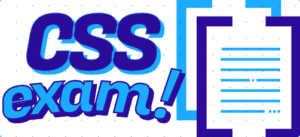Choosing optional subjects for the CSS exam is one of the most critical decisions every aspirant must make. With 600 marks depending on these choices, a smart selection can significantly impact your final score and overall chances of success.
If you’re new to the CSS journey, this guide will help you choose your optional subjects wisely — based on interest, background, scoring trends, and availability of resources.
🎯 Step 1: Understand the Structure of Optional Subjects
The Federal Public Service Commission (FPSC) allows you to choose optional subjects worth 600 marks. These are divided into groups (A to I), and you must select according to these rules:
One subject from Group 1 (200 marks)
Remaining 400 marks from any other groups (keeping group restrictions in mind)
🧠 Step 2: Identify Your Strengths and Interests
Choosing a subject just because it’s “trending” can backfire. Instead, ask yourself:
What subjects did I enjoy in school or university?
Do I like analytical subjects (e.g. Political Science), memory-based ones (e.g. History), or technical subjects (e.g. Physics)?
Am I comfortable writing long analytical answers?
📈 Step 3: Research Scoring Trends (But Don’t Obsess)
Some subjects are known for being high-scoring, while others are more volatile. Examples:
High Scoring (Generally): Criminology, Anthropology, Environmental Science
Unpredictable: International Relations, Political Science
Safe with Background: Law, Accounting, Sociology
👉 Remember: scoring trends change. Focus on how well you can prepare and write, not just past results.
📚 Step 4: Check the Syllabus and Past Papers
Before finalizing, download the official syllabus and check past papers. This helps you:
Understand the paper pattern
Judge the depth and difficulty of the content
Avoid overlaps (or use overlaps wisely)
For example:
IR + US History = good overlap
Gender Studies + Sociology = similar themes
📖 Step 5: Evaluate Resource Availability
You’ll need books, notes, MCQs, and possibly mentors. Don’t choose a subject that sounds good but has no good material or guidance.
Ask:
Are quality books available?
Can I find past paper solutions or coaching?
🧪 Step 6: Shortlist and Try a Mock Attempt
Shortlist 5–6 subjects and try writing a few answers. This helps you feel what works best.
You can also ask seniors or join forums like cssexam.net to get feedback on your options.
✅ Final Tips
Avoid Herd Mentality: Just because everyone is choosing IR doesn’t mean you should.
Balance Technical and Easy Subjects: Mix a technical subject with a general one for balance.
Stick to Your Decision: Once chosen, commit to it and start building confidence.
📌 Final Words
The “perfect” optional subjects don’t exist — but the right ones do, based on your own profile. Be strategic, do your research, and trust your gut. Smart choices today can lead to success in your first attempt.
Need help planning your CSS strategy? Join our CSS forum today and connect with other serious aspirants.






